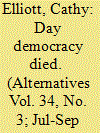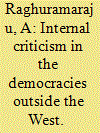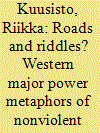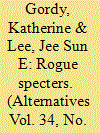|
|
|
Sort Order |
|
|
|
Items / Page
|
|
|
|
|
|
|
| Srl | Item |
| 1 |
ID:
092091


|
|
|
|
|
| Publication |
2009.
|
| Summary/Abstract |
The ethnoecocidal eradication of indigenous bodies, cultures, and cartographies in the United States, although not without resistance and remainder, gradually transformed densely textured networks of peoples and places into a cleared and open space upon which a nation could be imaginatively and materially composed. However, securing these lands as unambiguously "American" required an elaborate extension of these violent and amnesic cartographic practices. A reading of the US Declaration of Independence and discourses surrounding the US Constitution is used to demonstrate this, with the point of documenting the incessant forgetting requisite for contemporary American self-representations to hold sway and the violent ramifications that are thereby enabled.
|
|
|
|
|
|
|
|
|
|
|
|
|
|
|
|
| 2 |
ID:
092089


|
|
|
|
|
| Publication |
2009.
|
| Summary/Abstract |
The current fashion for good governance and promoting democracy as an integral element of development is ironically having depoliticizing effects because of its articulation with a technocratic and Westernized vision of what a good society might be like. Proceeding empirically and using texts relating to the assassination of Benazir Bhutto, this article demonstrates how discourses of democracy and development are mobilized in the contemporary international space, enabling the discursive taking of sides: for "democratic development" and against "Islamic extremism," in ways that elide other possible modes of seeing. "Democratic development" constitutes, and is constituted by, a "Western" (and British) identity in ways that are seductive, but also disciplinary: In particular, they turn out to produce and reproduce a particular set of gender relations as well as exhorting British Muslims to "fit in" with this identity. This exclusionary logic also transposes struggle over these power relations into an undemocratic international space. One key consequence of its mobilization is precisely the closing down of space for political resistance through democratic means, which I argue is not only ironically highly undemocratic, but also dangerous.
|
|
|
|
|
|
|
|
|
|
|
|
|
|
|
|
| 3 |
ID:
092092


|
|
|
|
|
| Publication |
2009.
|
| Summary/Abstract |
Democracy requires criticism. A significant feature of democracies outside the West, though often ignored by liberal traditions of analysis, is the practice of internal criticism. This article examines some experiences of internal criticism that may be found in the writings of some Indian philosophers, focusing especially on the work of Swami Vivekananda.
|
|
|
|
|
|
|
|
|
|
|
|
|
|
|
|
| 4 |
ID:
092090


|
|
|
|
|
| Publication |
2009.
|
| Summary/Abstract |
Our conceptual systems are metaphorical in nature: We understand complex issues by comparing them with relatively straight-forward and familiar ones. Renowned experts of nonviolent problem solving, such as Mahatma Gandhi, Albert Luthuli, and Martin Luther King, Jr., have structured difficult conflicts in terms of roads, gardens, building projects, and riddles. The conflict rhetoric of leaders of the major Western powers-the United States, Britain, and France-is most often studied in violent contexts, vis-à-vis epic battles and tragic catastrophes. However, when dealing with mundane disputes among fundamentally like-minded parties, disagreements with petty challengers and debates with major powers with different political systems, for example, US, British, and French leaders employ many of the metaphors that nonviolence activists do. Understanding and expanding this sphere of comic conflict resolution-where ingenuity and reflection instead of black-and-white juxtaposition are the norm-is essential in the search for a more peaceful, yet vibrant world.
|
|
|
|
|
|
|
|
|
|
|
|
|
|
|
|
| 5 |
ID:
092088


|
|
|
|
|
| Publication |
2009.
|
| Summary/Abstract |
The United States continues to label North Korea and Cuba "rogue states" of unique international distinction even though their economic, political, and military power has declined steadily since 1990. The authors argue that persistence of the label and accompanying US behavior is best understood by expanding upon a Schmittian frame of analysis to demonstrate that the designation of rogue state determines the normative weight given to certain behaviors, rather than the other way around. Examining the distinctive mode of politics practiced by North Korea and Cuba shows that they do pose threats to the United States, but not in the ways traditionally recognized by liberal states. Rather, through the anomalous role they play in the US-led system, their relentlessly polemical political discourse, and their excitable speech and ideological unmasking, they highlight the primacy of the political dimension determining their relationship with the United States and the contradictions underlying the universalism of US hegemony.
|
|
|
|
|
|
|
|
|
|
|
|
|
|
|
|
|
|
|
|
|